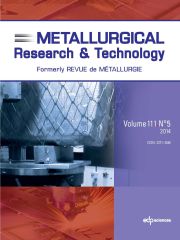Article contents
Study of the scale behaviour in the finishing mill to improvethe strip surface quality*
Published online by Cambridge University Press: 15 October 2010
Abstract
The cracking behaviour of the oxide layer formed during hot rolling was studied togetherwith different combinations of process parameters in order to find their single influenceon the surface quality and formation of oxide defects. Several trials were performed onthe CRM pilot line to study in detail the impact of strip reduction, strip temperature,entry scale thickness, roll degradation, lubrication, skin cooling, chemical compositionand humidity on the scale behaviour. In general, the degree of deformation, entry scalethickness and rolling temperatures are the most important parameters and the importancedecreases in that order.
Keywords
- Type
- Research Article
- Information
- Copyright
- © EDP Sciences
References
- 2
- Cited by


